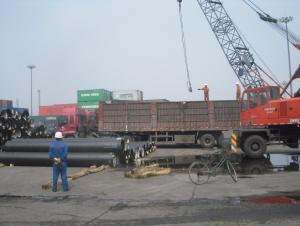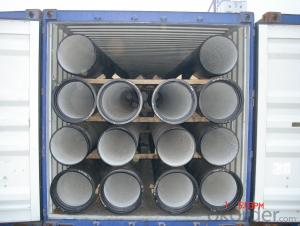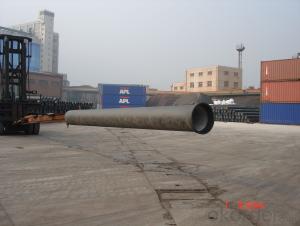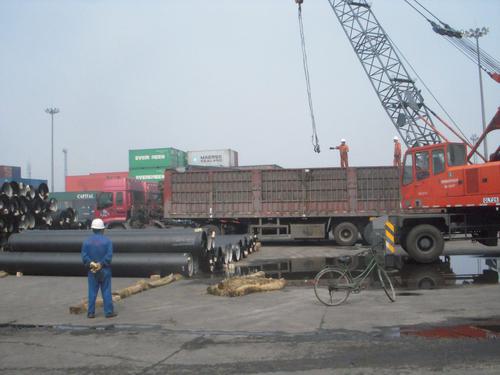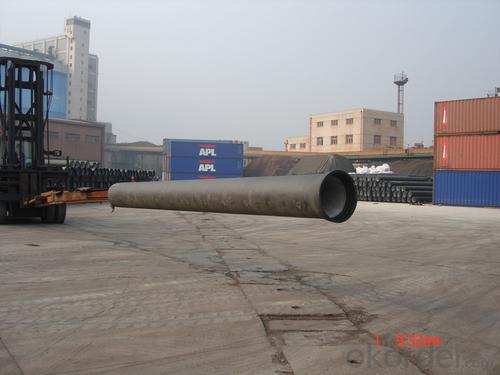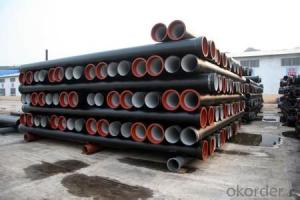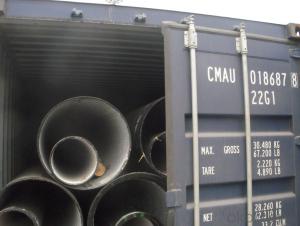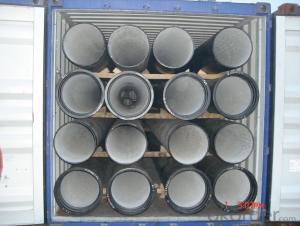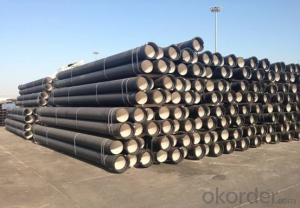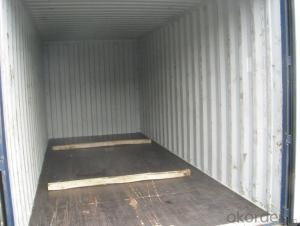DUCTILE IRON PIPES K8 DN400
- Loading Port:
- China Main Port
- Payment Terms:
- TT OR LC
- Min Order Qty:
- -
- Supply Capability:
- -
OKorder Service Pledge
OKorder Financial Service
You Might Also Like
Ductile Iron Cast Pipe is without any defects compare with tradition casting tech, which has many advantages particularly as follow:
(1) High density. In the "vertical upward casting" process, the melt iron of centre liquid column in center crystallizer is continuously feeding for volume shrinkage caused by condensation tube at outer circumference , which lead to be free of shrinkage porosity.
(2) High purity. When melt iron pouring, the mixed impurities such as gas, dross, sand grain which are lighter than melt iron could be eliminated at furnace mouth, its impossible to enter into the crystallizer through the channel, so the melt iron into the crystallizer is very pure.
(3) Strength with toughness. The cooling speed provided by continuous crystallizer is 30 times than sand casting and 5 times than centrifugal casting, and doesn't produce white iron, the eutectic cell volume of continuous cast iron is one eighth to one tenth compare with traditional cast iron. The density of graphite nodule in ductile iron can reach 300-700 pcs/mm2. Therefore, all reason above improve the strength and toughness of continuous cast iron.
(4) Free machining. The high speed cooling make the hardening phase (such as boride, steadite) not appear like reticular, massive or thick, but diffuse like fish bone and pane in shape, moreover, there are tiny graphite flakes inlaid hardening phase. It's free machining in BrinellHardness the range of 250-300HB. However, the Brinell Hardness of 250 is top limit to common metal materials.
(5) Uniform composition of tube wall. The convection mixing of liquid column caused by marching type drawing in crystallizer make the composition of tube wall well-distributed, and concentration gradient very little.
(6) High productivity. To the wall thickness of tube under 10mm, the speed of continuous casting is 1 meter/min, to the wall thickness of tube under 20mm, the speed of continuous casting is 0.5 meter/min, which is high efficiency that centrifugal or other casting tech couldn't reach.
- Q: Are ductile iron pipes suitable for use in irrigation gate systems?
- Yes, ductile iron pipes are suitable for use in irrigation gate systems. Ductile iron is known for its durability, strength, and corrosion resistance, making it an ideal choice for applications requiring reliable and long-lasting piping systems like irrigation gate systems. Additionally, ductile iron pipes have excellent flow characteristics, allowing for efficient water distribution in irrigation systems.
- Q: Are ductile iron pipes suitable for road crossings?
- Yes, ductile iron pipes are suitable for road crossings. Ductile iron is a strong and durable material, making it well-suited for underground installations such as road crossings. The pipes have high tensile strength, which allows them to withstand heavy loads and traffic pressures without cracking or breaking. Ductile iron pipes also have excellent corrosion resistance properties, ensuring their longevity even in harsh environments. Additionally, these pipes are easy to install and maintain, making them a reliable choice for road crossings.
- Q: What is the difference between ductile iron pipes and cast iron pipes?
- Ductile iron pipes and cast iron pipes have different compositions, properties, manufacturing processes, and applications. Ductile iron pipes are made from a type of cast iron known as ductile iron, which contains higher levels of carbon, silicon, and other alloying elements like magnesium. On the other hand, cast iron pipes are made from regular cast iron, which has a higher carbon content and lower levels of alloying elements. In terms of properties, ductile iron pipes are recognized for their high tensile strength, flexibility, and durability. They can withstand higher pressure and have a greater resistance to impact, making them suitable for applications that demand robust performance. Conversely, cast iron pipes are more brittle and fragile, making them susceptible to cracking or breaking under pressure or impact. The manufacturing process differs as well. Ductile iron pipes are formed through centrifugal casting, in which molten ductile iron is poured into a spinning mold. This centrifugal force aids in the even distribution of the molten metal, resulting in a strong and uniform pipe. On the other hand, cast iron pipes are made using sand casting, where molten cast iron is poured into a mold made of compacted sand. This method is less precise and can result in variations in the final product. In terms of applications, ductile iron pipes are commonly used in water and sewage systems, as well as in industrial pipelines that require high-pressure resistance. Cast iron pipes, on the other hand, are typically used in non-pressure applications such as drainage systems or underground sewer lines. To summarize, ductile iron pipes and cast iron pipes differ in their composition, properties, manufacturing processes, and applications. Ductile iron pipes offer greater strength, flexibility, and durability, making them suitable for high-pressure applications, while cast iron pipes are more brittle and commonly used in non-pressure applications.
- Q: Are ductile iron pipes recyclable?
- Indeed, it is true that ductile iron pipes possess recyclability. Ductile iron, which belongs to the cast iron family, showcases exceptional sturdiness and endurance, rendering it an ideal selection for a wide array of applications, encompassing water and sewage systems. Once these pipes surpass their lifespan, they can undergo recycling and repurposing. The recycling procedure involves the fusion of the ductile iron pipes, employing the molten metal to generate fresh pipes or alternative iron-based commodities. By recycling ductile iron pipes, not only do we contribute to the conservation of natural resources, but we also curtail the volume of waste that inundates landfills. Hence, ductile iron pipes are perceived as a sustainable and eco-friendly alternative for piping systems.
- Q: What is the manufacturing process of ductile iron pipes? Thank you
- Ductile iron pipe is a pipe dream of urban water supply, gas pipelines, sets of high strength, good ductility and corrosion resistance strong strength, has the essence of iron, steel, cast iron pipe and steel pipe is a traditional popular replacement products, is a kind of widely used pressure water supply, gas and send pipes. Has the advantages of high strength, good toughness, corrosion resistance and easy device and other excellent characteristics, is the traditional grey iron and steel pipe replacement products popular, has become the preferred data of water supply, gas industry, set high strength, good ductility and corrosion resistance strong strength, has the essence of iron, steel, is the traditional cast iron pipe and steel pipe replacement products under the popular small as you introduce the ductile iron pipe is how to make the.
- Q: Can the underground cast iron pipes be connected with clamps to form buttress?
- Best not to, because the use of clamp connection way to connect the poor integrity of the pipeline, the base treatment is not in place or uneven settlement, it is easy to produce deformation, resulting in pipe bending deformation, easily leaked from the junction.
- Q: Can ductile iron pipes be used for road and highway drainage?
- Yes, ductile iron pipes can be used for road and highway drainage. Ductile iron pipes have excellent strength and durability, making them suitable for use in various applications, including drainage systems. They have high tensile strength and can withstand heavy loads and traffic, making them ideal for road and highway drainage where constant vehicle movement is expected. Ductile iron pipes are also resistant to corrosion and offer a long service life, reducing maintenance and replacement costs. Additionally, their smooth inner surface allows for efficient water flow, preventing waterlogging and ensuring proper drainage. Therefore, ductile iron pipes are a reliable and effective choice for road and highway drainage systems.
- Q: What kind of joints are used with ductile iron pipe?
- The most commonly used joints with ductile iron pipe are push-on joints and restrained joints.
- Q: Advantages and disadvantages of ductile iron pipes?
- Nodular cast iron has high strength and strong plasticity. The tensile strength of ductile iron is twice that of gray iron, and the yield strength even exceeds that of cast steel. So, the ball compressive strength of ductile iron pipe is much higher than that of cast iron pipes, buried in the ground, the car is not easy to be crushed.
- Q: Are ductile iron pipes suitable for water distribution networks?
- Ductile iron pipes are a suitable choice for water distribution networks. They have been widely used in water distribution systems for many years, thanks to their numerous advantages. To begin with, ductile iron pipes possess excellent durability and a long lifespan. Their resistance to corrosion is crucial for water pipes since they are continuously exposed to various chemicals and substances in the water. This corrosion resistance ensures that the pipes maintain their structural integrity over time, reducing the frequency of repairs or replacements. Furthermore, ductile iron pipes have a high strength and can withstand high pressure, making them ideal for water distribution networks. They can handle heavy loads and resist external forces such as soil movement or traffic loads, guaranteeing the safety and reliability of the water supply. Moreover, ductile iron pipes exhibit excellent hydraulic properties. With their smooth internal surfaces, they minimize friction and pressure drop, enabling the efficient flow of water through the system. This aids in conserving energy and reducing pumping costs, making ductile iron pipes a cost-effective choice for water distribution networks. Additionally, ductile iron pipes are versatile and can be easily installed in various soil conditions. They can endure ground movement and settle without breaking, which is crucial for maintaining a stable water distribution system. In conclusion, ductile iron pipes are highly suitable for water distribution networks due to their durability, resistance to corrosion, high strength, excellent hydraulic properties, and versatility in installation. They offer a reliable and efficient solution for delivering safe and clean water to communities.
Send your message to us
DUCTILE IRON PIPES K8 DN400
- Loading Port:
- China Main Port
- Payment Terms:
- TT OR LC
- Min Order Qty:
- -
- Supply Capability:
- -
OKorder Service Pledge
OKorder Financial Service
Similar products
Hot products
Hot Searches
Related keywords
